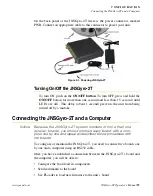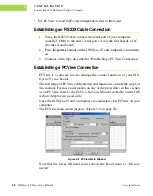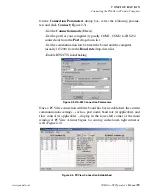
16
JNSGyro-2T Operator’s Manual
www.javad.com
I N T R O D U C T I O N
Principles of Operation
1
Principles of Operation
The measuring with the right GPS board can provide users accurate and precise
positioning, a requirement for any measuring project.
This section gives an overview of GPS and board functions to help you
understand and apply GPS principles, allowing you to get the most out of your
board.
GPS Overview
The Global Positioning System (GPS) is a satellite-based, line-of-sight
radio navigation system run by the United States Department of Defense
(DoD). This system offers a global, all weather, 24-hour positioning, veloc-
ity, and time service to any user equipped with a GPS tracking receiver,
who is on or near the Earth’s surface. The Global Navigation Satellite Sys-
tem (GLONASS) is the Russian Federation Ministry of Defense counterpart
to GPS. At any one time, with a standard 15-degree angle, up to 10 or 12
GPS satellites are visible from any point on earth. When a board can also
track GLONASS satellites, between 10 and 16 satellites are visible.
For information on the status of the GPS constellation, visit
http://tycho.usno.navy.mil/ or http://www.navcen.uscg.gov/.
For GLONASS, visit http://www.glonass-center.ru/frame.html.
Despite numerous technical differences in the implementation of these sys-
tems, both GPS and GLONASS have three essential components:
• Space – GPS and GLONASS satellites orbiting approximately 12,000
nautical miles above Earth and are equipped with a clock and radio.
These satellites broadcast digital information (ephemerides, almanacs,
time frequency corrections, etc.).
• Control – Ground stations located around the Earth that monitor the sat-
ellites and upload data, including clock corrections and new ephemeri-
des (satellite positions as a function of time), to ensure the satellites
transmit data properly.
• User – The community and military that use GPS/GLONASS receivers
and the corresponding satellites to calculate positions.
















































